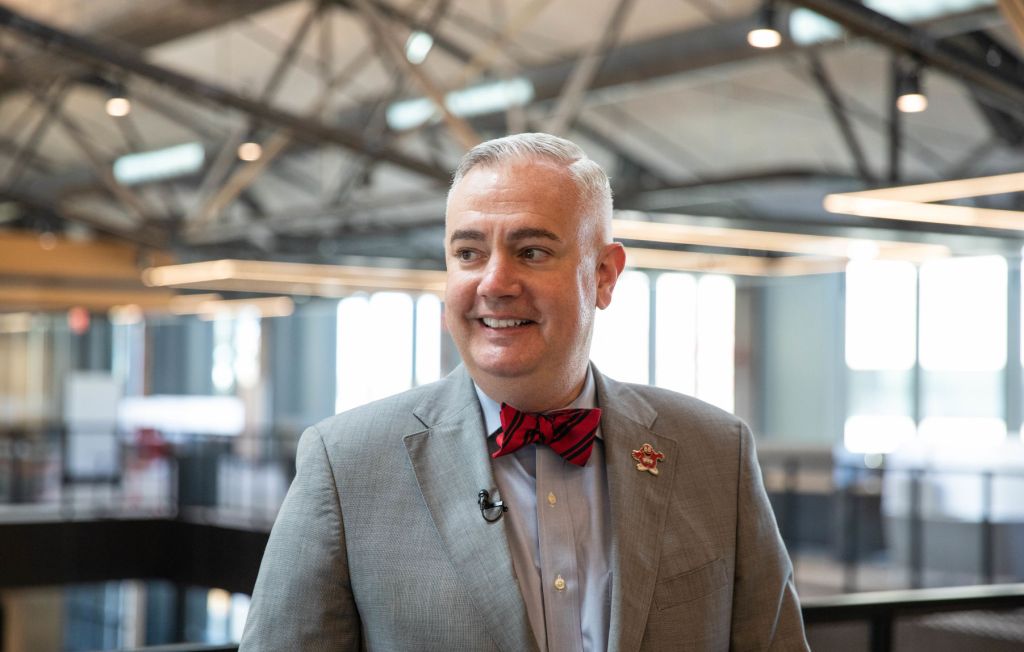WKU to seek additional state funding due to inflationary pressure
Published 8:00 am Saturday, December 9, 2023

- Western Kentucky University President Timothy Caboni speaks about his excitement for the opening of the WKU Commons at Helm Library on Monday, April 18, 2022, as he tours the facility with other campus officials and dining facility representatives on Thursday, April 14. Under construction since 2019, the former Helm Library turned into a study and dining venue features food venues such as Moe’s Southwest Grill, Rising Roll gourmet café, Spencer’s Coffee, Panda Express and other dining options, and two floors of study rooms, open seating, computer labs and rows of book shelves. (Grace Ramey/photo@bgdailynews.com)
Western Kentucky University President Timothy Caboni said the university’s top legislative priority going into January will be seeking additional base and performance funding from the state.
Caboni said after WKU’s Board of Regents quarterly meeting Thursday that he’s “thankful for what the legislature did last budget session” but inflation has hindered institutional progress.
“We’ve had investment performance funding for several years, but given the challenges the institution has faced with inflation … we can’t use one-time-dollars to address recurring expenses or electricity and materials that we use on campus,” Caboni said.
Fiscal year 2023 saw $67.6 million in base funding and $7.8 million in performance funding go toward WKU, with state appropriations accounting for roughly 22% of WKU’s $383.4 million budget.
Caboni said performance funding, which determines an institution’s share of the state budget based on factors like course completion and student success, has proven beneficial for WKU but does not match the institution’s greater contribution to the region.
“We think we need to continue to see that progress as we make the case with the legislature — our role in increasing the workforce and region’s economy,” Caboni said.
He added that several facilities across campus require renovations or replacement, which additional funding would help accelerate. The board approved in April WKU’s six-year capital plan, which authorizes the university to take on major capital projects if funding permits.
The five priorities identified by WKU for the 2024-26 timeframe were renovations to the Academic Complex, Potter College of Arts and Letters facilities, Cherry Hall, Innovation Campus and Raymond Cravens Library.
Caboni presented an amendment to the capital plan in May to replace the Academic Complex rather than only renovate, which Caboni said is still WKU’s first priority. The plan originally requested $90 million in renovations but later sought $160 million for replacement.
Executive Vice-President for Strategy, Operations and Finance Susan Howarth said facilities and technology costs have been particularly vulnerable to inflationary pressures and added they are looking to trim away unnecessary costs, especially in software and maintenance.
During the meeting, Regents presented a synopsis of Caboni’s annual evaluation and updates on FY2024’s budget.
The synopsis, read by Chair Wilton Currie Milliken, stated Caboni has increasingly shown to be “an effective leader with a remarkable ability to advance our university, create stability, and promote an overall culture of excellence and innovation.”
“The Board of Regent’s review of President Caboni’s performance makes clear that, because of the difficult work undertaken and the success of those endeavors, WKU is better positioned for the future under his leadership,” the synopsis stated.
Regents pointed to the “positive momentum” set forth under Caboni as evidence of his success, including the first increase in degree-seeking enrollment in 13 years, the highest first-to-second-year student retention rate in WKU history, the start of construction on the new Gordon Ford College of Business building and more than $92.9 million in commitments to the WKU Opportunity Fund.
Caboni said he’s grateful for the evaluation, adding that “higher education is not without challenges, but we’ve navigated well.” He also pledged to “redouble my efforts to engage with the community” to meet construction and fundraising goals and “continue our upward trajectory.”
“We have some not-yet-announced commitments in hand and other very exciting things (and) we will talk about those in the spring semester,” Caboni said.
Regents also reviewed WKU’s 2023-24 Statement of Revenues & Expenditures, which showed that $127.9 million in revenue, or 39% of the annual budget, has been realized.
The statement attributes this, in part, to an “increase in several categories including a $1.36 million increase in net tuition revenue.” Actual net tuition revenue is approximately 50% of the budgeted amount.
Revenue overall is tracking 1% above last year by this time, which Howarth said “helps a lot financially.”
So far, total expenses for FY 2024 were $107.2 million, or 32% of the budget. The statement shows that personnel costs increased by approximately $1.9 million largely due to a 2% across-the-board salary increase at the beginning of the fiscal year.
“I think what’s noteworthy from the expenses standpoint is that utilities continue to track below budget,” Howarth said. “Maintenance (costs) were down in the end of the first quarter, operating (costs) up slightly, but we all feel inflationary pressures overall.”
After $11 million in overspending across the university in fiscal year 2023, roughly 3% of its budget, Assistant Vice President for Budget, Finance and Analytics Renaldo Domoney told the Daily News in October that steps would be taken to prevent future gaps, including monthly meetings with vice presidents and deans to discuss spending.
Howarth said they’ve begun looking at November numbers and sharing them among administration and budget managers, adding that the increased attention is “working good and we’re making progress.”
“At the first of the year, I’m going to start meeting with (budget managers) weekly, and I think that will add a lot,” Howarth said. “I think this will be an opportunity for them on a weekly basis to he able to talk about what’s going on in Gordon Ford College of Business, what’s going on in Potter, so that they really understand how important their role is.”
The regents will meet for a committee meeting on Jan. 19, with the next quarterly meeting slated for March 1.





